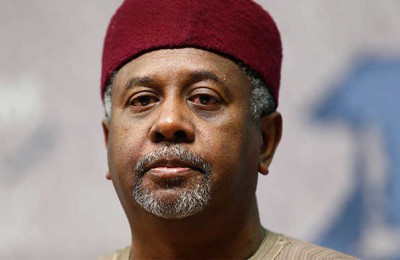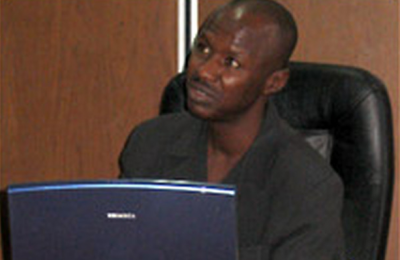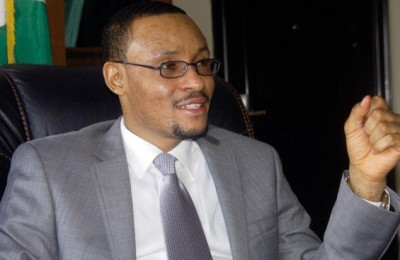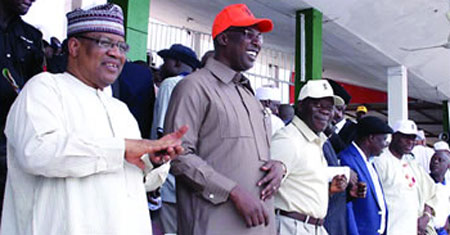It has long been certain that “the wheels of justice grind slowly”, (in Nigeria and other less refined societies, usually oiled by Corruption) yet, contrary to the old adage, they don’t necessarily “grind exceedingly fine.” In all cases, it is the victims that suffer the consequences.
In many cases, hearings are listed intermittently, weeks, if not months, apart. They are interrupted in the middle of cross-examinations, for instance, which have to be resumed after a long hiatus. Not only does this not serve the cause of justice, it subverts it. In our non-jury system we trust judges to retain their impressions of witnesses for unreasonably protracted periods.
Prosecutors, witnesses, and even judges however, can hardly be trusted especially in this decadent society which is endemic with corruption. Then there are lots of external, often sinister influences, not only from the government itself, but also from various selfish political and individual interests. This is the crux of the matter.
Yet this anomaly isn’t preordained or immutable. Perhaps the time has come to copy the US system, where trials are conducted continuously – full day after full day. This isn’t unfeasible here. We can take leave of inefficient, though familiar, legal habits and overhaul the system – even if vested interests are sure to be sacrificed along the way. Our civic hygiene will not be cleansed and respect for the rule of law will not be sustained until our judicial system are forced to respect others’ time and abide by timetables just as ordinary citizens must. Now, it is alright if the victim is actually guilty, or eventually found guilty; after all, we will say Justice has been served, and we will say one is innocent until proven guilty, but in our dear country, you are usually guilty until proven innocent, and by that time, you have suffered a great deal and have been subjected to indignities and trauma due to delay of justice and trampling of your rights.
A particularly sad illustration of deliberate official and judicial foot-dragging, manipulation of the judicial process and disregard for the rule of law and human rights, was added recently in the case of the Economic and Financial Crimes Commission (EFCC) versus Chief Joe Musa, erstwhile Director General of the National Gallery of Arts and three other Directors of the department (Dr Kweku Tandoh, Mr Olusegun Ogunba and Mrs Elizabeth Oparagu). Mr Joe Musa and these three others were arrested, detained and prosecuted in a miasma of unfounded, disgraceful and spurious allegations of theft and embezzlement by the EFCC in July 2009 and for the last two and a half years their lives have been turned upside down, their families have suffered trauma and humiliation and their careers put on hold. Mr Musa (D-G) and one of the co-defendants, Dr Kweku Tandoh, an Executive Director, were appointed in 2006 by Chief Femi Fani-Kayode, who was then the Minister for Culture and Tourism in the Obasanjo Administration.
A case that never should have reached court in the first place dragged on and on for almost three years due mostly, at best, to the incompetence of the EFCC investigators and lawyers, and at worst, possibly due to corrupt compromise, blatant and arrogant disregard for the judicial process and the rights of man.
The legal axiom, “Justice delayed is justice denied” means that if legal redress is available for a party that has suffered some injury, but is not forthcoming in a timely fashion, it is effectively the same as having no redress at all. This principle is the basis for the right to a speedy trial and similar rights which are meant to expedite the legal system, because it is unfair for the injured party to have to sustain the injury with little hope for resolution. The phrase has become a rallying cry for legal reformers who view courts or governments as acting too slowly in resolving legal issues either because the existing system is too complex, corrupted or overburdened, or because the issue or party in question lacks political support.
On December 6, 2011, the Federal High Court in Abuja not only acquitted and discharged these people of all the charges but the Judge, Justice O.A Adeniyi (Commendation is due to this learned man of courage and integrity), in his 33–page ruling, also lambasted the EFCC for filing criminal charges against them that were based on nothing but ”pepper soup and beer parlour gossip” and for wasting their time and the courts time for two and a half years. The judge said that based on the evidence that was presented, the EFCC should NEVER have filed charges against these four innocent civil servants in the first place and that they should not have sought to torment them in this way and almost destroy their lives. The Honourable Justice even went as far as saying that he would have wanted to compel the EFCC to pay heavy damages to these people for the injustice that have been done against them by opting to charge them to court almost three years ago.
Following my own knowledge and investigations into the case, the following is a timeline and chronology of their ordeal:
- It all started when Mr Joe Musa and 4 of his directors received a call from the EFCC on Friday, July 17, 2009 asking that all the directors and the D-G should come to their (EFCC’s) office on Monday 20th July 2009 for a meeting. When they got there on that day, they noticed after a while that one of the Directors (Abdullahi Muku) had left the room where the other Directors and the D-G were waiting. Shortly after, the EFCC officers came to the waiting men with court papers and said they were taking them to court right away to charge them to court. On arrival at the court, there were TV cameras, print media men already waiting for their arrival.
- The judge granted the accused’s’ oral application for bail but with conditions which could not be fulfilled on that day, so they spent some days in prison detention before the bail conditions were met. The DG and one of the directors spent two nights but the other two spent four nights. The director who had been with them at the EFCC office and who had sneaked out was not charged. (He is currently the D-G of the NGA) After the arraignment in court on that date, the case officially started on October 19, 2009.
- Meanwhile, the Chairman of the Board of the National Gallery of Arts (NGA) had suspended the four arraigned officials of the NGA without pay on July 28, 2009.
- Mr Musa and the three other accused then started going to court for a total of 14 occasions between October 19, 2009 and December 6, 2011 and out of that, nine (9) of the adjournments were at the instance of the EFCC lawyer who always failed to produce his witnesses for frivolous reasons.
- Of all the directors of the NGA, only the director, who surreptitiously left the EFCC Office, Alhaji Muku, was not charged to court in the case. As at that time, he was the most junior of all the directors.
- All the eight prosecution witnesses who came to court to peddle falsehoods and lies were disgruntled staff of the NGA who all had one grouse or the other against the DG.
- For the two and a half years the case was in court and with the support of Barrister Peter Eze (the former Board Chairman) , Muku got himself confirmed as D-G; all the petitioners (who were also the prosecution witnesses) have since received rapid promotions and other benefits and are now occupying sensitive positions in the NGA.
- The writers of the initial petitions against Joe Musa and the other directors were the same people who became prosecution witnesses for the EFCC.
- The former Board Chairman, Peter Eze was so consumed in his desire to suspend the directors in 2009 that he unilaterally took the decision without the input of the other board members and in so doing, deliberately ignored and failed to follow due process. Furthermore, he went to the Police to report Joe Musa and the three directors and accused them of threatening the peace of the NGA and should be arrested.
- For the two and a half years the case was on, Joe Musa and the three directors were suspended without pay thereby putting them and their families in very serious financial distress.
- When the case commenced in July 2009, the EFCC employed the whole of the electronic and print media to state that they had all the evidence they needed to prosecute the case etc. Yet, and isn’t it strange, that the EFCC lawyer kept delaying the case for over a year until the judge gave them an ultimatum?
- At the end of it all, there was no shred of evidence produced in court as stated clearly in the judge’s ruling – the case of the EFCC was all based on “pepper soup and beer parlour gossip” – according to the presiding judge’s ruling.
Questions that need be answered:
- Was the whole case a setup from the beginning by Alhaji Abdullahi Muku, present D-G of NGA and some other staff to get rid of former D-G Joe Musa and the other directors so that they could take over the management of the NGA?
- Why was Alhaji Abdullahi Muku who was also a director in the NGA at the time, not charged along with all the other directors?
- What was the role of the former board chairman, Barrister Peter Eze in this sinister plot against Joe Musa and the others?
- If as the court stated clearly in its ruling the prosecution witnesses peddled lies and gossips in court, shouldn’t they as civil servants and staff of the NGA be disciplined for writing false petitions and peddling lies in court against their superiors?
- Why have the petition writers (who are staff of the NGA and also were prosecution witnesses) received rapid promotions and other such benefits at the NGA between the time the case started in 2009 and now?
- Why was the EFCC lawyer Steve Odiase more interested in delaying the case by asking for adjournments spanning over a one year period? Was it to allow for Muku and the others to consolidate themselves in office?
It is imperative that the Honourable Minister of Culture and Tourism, Chief Edem Duke, sets up a panel of inquiry to look into these very serious issues so that justice can be seen to have been done.
In this particular case, commendation must go to the Judge, Justice Adeniyi, a courageous and fair man of law, who many times faced sly and cunning tactics from the EFCC lawyer, and whose patience finally expired after the incessant and obvious delay tactics being employed. He saw through these tactics, and although legally bound to be exhaustive in his hearing of the case, decided that the case does not, after almost three years, have any merit and a halt needed to be called to this ugly, deceitful, deceptive and fraudulent charade being paraded by the EFCC with the active collaboration, if not persistence, of these insidious, deceitful and invidious NGA petitioners in the name of legal process and rule of law..
What the case has highlighted (and there are many hundreds of such cases in Nigeria) to me personally and what Nigerians should be worried about is the arrogant and dastardly display of power by supposedly law enforcement agents; manipulation of the system to suit insidious and self-serving ambitious purposes; political intrigues even in the Civil Service; the frequency, and apparently normalcy of trampling on the human and civil rights of the citizenry by those in positions of authority in the name of fighting crime, including corruption; and a blatant disregard for humaneness and compassion for our brothers and sisters in our society.
With the conclusion of this farce and fiasco (unfortunately, it is not so funny to the victims, Joe Musa and the three directors) it is our hope and call to the Minister in charge to investigate the past and current leadership and management of the National Gallery of Art as to why and how such conniving, conspiratorial, despicable and utterly malevolent members of staff of this high profile department of government could successfully manipulate the country’s foremost anti-corruption agency and the Federal Government of Nigeria, with the latter ending up with eggs all over their collective faces.
The innocent D-G and the three directors should be quickly paid their owed salaries and allowances spanning two and a half years and reinstated fully to their former positions in the civil service.
There is currently no board in place for the NGA as all boards were dissolved by the President in September and that of the NGA is yet to be reconstituted.
The Truth must be said always.
I wish you ALL a Happy New Year.














